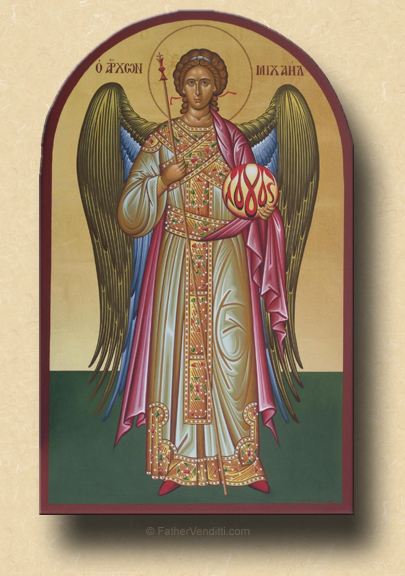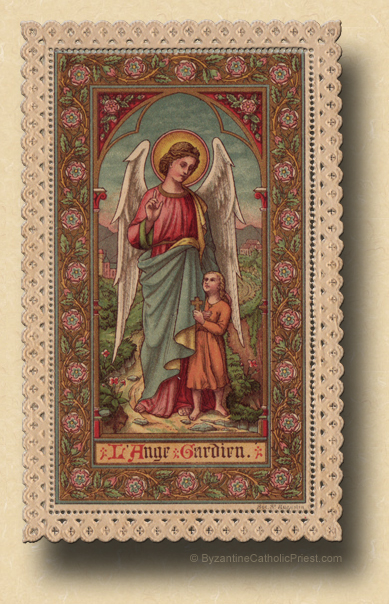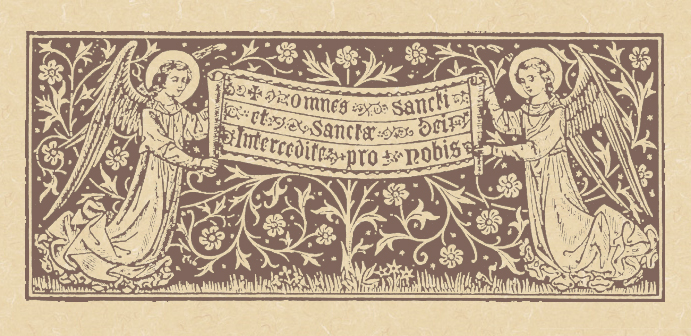The Blue Mass: Honoring Those Who Protect and Serve.
The Memorial of Saint Jerome, Priest & Doctor of the Church.*
Lessons from the primary feria, according to the ordinary form of the Roman Rite:
• Zechariah 2: 5-9, 14-15.
• [Responsorial] Jeremiah 31: 10-13.
• Luke 9: 43-45.
…or, from the proper:
• II Timothy 3: 14-17.
• Psalm 119: 9-14.
• Matthew 13: 47-52.
…or, any lessons from the common of Doctors of the Church, or the Common of Pastors. |
The Third Class Feast of Saint Jerome, Confessor & Doctor of the Church.
Lessons from the common "In médio…" of a Confessor for a Doctor, according to the extraordinary form of the Roman Rite:
• II Timothy 4: 1-8.
• Psalm 36: 30-31.
• Matthew 5: 13-19.
The Sixteenth Saturday after Pentecost; and, the Feast of the Holy Martyr Gregory, Bishop of Armenia.**
First & third lessons from the pentecostarion, second & fourth from the menaion, according to the Ruthenian recension of the Byzantine Rite:
• I Corinthians 14: 20-25.
• I Corinthians 16: 13-24.
• Luke 5: 17-26.
• Matthew 24: 42-47.
FatherVenditti.com
|
 8:12 AM 9/30/2017 — We are so pleased here at the Shrine to provide this special day, and offer this special Mass, for the members of our local constabulary. We call it the “Blue Mass,” even though not every police department’s uniform is blue, but many around the country are. And we’ve wanted to do this for a long time for two reasons: not only to thank the members of the Washington Police Department for assisting us here by providing security and help during some of our large event days here, but also for the protection they and the members of our local New Jersey State police troop provide unseen, day after day, night after night, watching over our grounds, and particularly when they respond so understandingly on those occasions when I’ve inadvertently set off an alarm somewhere on the property, and always being so gracious about it. 8:12 AM 9/30/2017 — We are so pleased here at the Shrine to provide this special day, and offer this special Mass, for the members of our local constabulary. We call it the “Blue Mass,” even though not every police department’s uniform is blue, but many around the country are. And we’ve wanted to do this for a long time for two reasons: not only to thank the members of the Washington Police Department for assisting us here by providing security and help during some of our large event days here, but also for the protection they and the members of our local New Jersey State police troop provide unseen, day after day, night after night, watching over our grounds, and particularly when they respond so understandingly on those occasions when I’ve inadvertently set off an alarm somewhere on the property, and always being so gracious about it.
We chose this day because it’s the closest Saturday to the Feast of Saint Michael the Archangel, which was yesterday. He is the saint and angel to which we most often pray for protection against spiritual evil, just as we so often depend on those we honor today for protection against more worldly evils. It is a sacred trust, without which none of us would enjoy the life and freedom we so often take for granted. After Holy Communion today, we will bless this statue of the Archangel Michael in honor of those who serve our community in uniform, and it will find a place of honor here at the Shrine as a reminder of just that to all who visit here.
This point was brought home to me personally by a young friend with whom I communicate regularly on social media. She lives in a very poor communist country. She had found a You Tube video from our country, taken from a stop light traffic cam, showing an elderly woman with a walker attempting to cross a busy street, afraid to even try it because she knew she’d never get across before the light changed again; and, out of no where, a motor cycle patrolman rode up, dismounted his bike, and stopped all the traffic so that she could cross the street safely. And she asked me why the officer had done that, to which I replied that it’s one of the most important functions of law enforcement: to protect and serve the citizens whose safety have been entrusted to their care. She said that nothing like that would ever be seen in her country. It’s a reminder to all of us of how fortunate we are to enjoy the protection that law enforcement here provides to all of us, and how often we take it for granted.
But what makes it even more important that we do this now is the simple fact that we are living in a time, in our own country, when those who have accepted this sacred trust—and, let’s face it: no one ever got rich being a policeman—have been more maligned and disrespected than at any other time that I can remember.  Oh, sure, there were people who, fueled by their own inadequacies and mental confusion, protested law enforcement back in the ‘60s and early ‘70s, but I don’t remember officers being ambushed and murdered simply because they wore the uniform. That’s something new, and it reflects an evil and an ignorance of the very fundamental fact that, often, the laws policemen are required to enforce exist not only to keep us safe from others who wish to do us harm, but are also there to protect us from ourselves when we act irresponsibly. I’ve never been a policeman, so I don’t know for sure, but I’m guessing that one of the most difficult calls an officer responds to is one in which someone is putting himself or herself at risk, because it is so easily misunderstood, especially in those circumstances in which alcohol, drugs or mental illness are involved. Part soldier, part psychiatrist, part marriage counselor, sometimes part doctor in an emergency. I can’t think of a more difficult job. Being a priest has it moments, too, but rarely the kind which so often can make the difference between life and death. Nor do I put my own life on the line when I walk out the door each morning, as every police officer does every day. Oh, sure, there were people who, fueled by their own inadequacies and mental confusion, protested law enforcement back in the ‘60s and early ‘70s, but I don’t remember officers being ambushed and murdered simply because they wore the uniform. That’s something new, and it reflects an evil and an ignorance of the very fundamental fact that, often, the laws policemen are required to enforce exist not only to keep us safe from others who wish to do us harm, but are also there to protect us from ourselves when we act irresponsibly. I’ve never been a policeman, so I don’t know for sure, but I’m guessing that one of the most difficult calls an officer responds to is one in which someone is putting himself or herself at risk, because it is so easily misunderstood, especially in those circumstances in which alcohol, drugs or mental illness are involved. Part soldier, part psychiatrist, part marriage counselor, sometimes part doctor in an emergency. I can’t think of a more difficult job. Being a priest has it moments, too, but rarely the kind which so often can make the difference between life and death. Nor do I put my own life on the line when I walk out the door each morning, as every police officer does every day.
The Mass we offer together today is the one required for this day, the Memorial of Saint Jerome, and I would have loved to preach about him, but this was more important. So, on this special day on which we thank and honor those who put themselves on the line every day to keep us safe, let’s never forget that we wouldn’t be able to so freely practice and live our faith without the help and protection of those we honor today. May Saint Michael the Archangel protect them from harm as they discharge their sacred trust, and may we never cease to appreciate them and pray for them daily, that our Blessed Lord will watch over them always, provide grace and help to their families, and ultimately reward them for the sacrifices they make for us every day.

* Cf. the post here to view a homily on the life and work of St. Jerome.
** Born in Armenia, Gregory the Illuminator spent his early years in Cæsarea of Cappadocia, returning to his native Armenia as bishop, where his preaching was responsible for the conversion of King Tiridates III, who proclaimed Christianity the state religion, making the Kingdom of Armenia the first nation to embrace Christianity officially. He died at an advanced age in the year 330.
It is unclear why the typicon refers to him as a martyr, since in the many detailed accounts of his life, while he often suffered for fearlessly preaching the truth, he died in monastic retirement, leaving behind a country converted to Christ. He is regarded as the founder and first bishop of the Armenian Apostolic Church, and the patron saint of Armenia.
|

